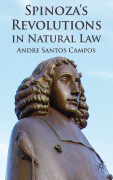
This very first analysis of Spinoza's philosophy of law from the viewpoint ofhis deterministic ontology shows that he revolutionized modern philosophy from within by developing an entirely new natural law theory connecting his ontology to radically democratic political views. The book forms a balanced structure in which the three conceptual pillars of Spinoza's natural law theory (individuality, natural laws, and power) are first analyzed from the viewpoint of his ontology and then from the viewpoint of his political theory. Spinoza's revolutionary equivalence of law to power is regarded as the core simultaneously of an ethical individualistic project, of a democratic alternative to modern State politics, and of an amoral naturalistic philosophy of law. The author concludes that Spinoza develops a new type of progressive individualism still left to explore that revolutionizes both modern natural law and contemporary radical democratic studies. INDICE: Acknowledgements.Abbreviations.Introduction .PART I: NATURAL LAW.Individuality.Laws of Nature.Power.PART II: POLITICAL NATURAL LAW.Multitude.State.Sui juris.Conclusion.Notes.Bibliography.Index.
- ISBN: 978-0-230-34869-1
- Editorial: Palgrave Macmillan
- Encuadernacion: Cartoné
- Páginas: 224
- Fecha Publicación: 13/04/2012
- Nº Volúmenes: 1
- Idioma: Desconocido
